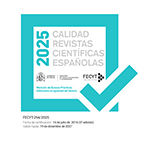De la 'Divina Comedia' de Dante Alighieri a la 'Gottlose Komödie' de Peter Weiss. Alegoría y crítica política en el drama 'Inferno' (1964)
Resumen
Entre los años 1964 y 1969, Peter Weiss trabaja en un ambicioso proyecto de reescritura dramática de la Divina Comedia que se conoce como DC-Projekt y que está considerado como uno de los casos de dantismo creativo contemporáneo más originales y fascinantes del siglo XX. El presente artículo se centra en el análisis del drama Inferno (1964), una pieza dramática, aún inédita en España y concebida como parte integrante de dicho proyecto. El examen de la obra se realiza desde una perspectiva comparatista, especialmente atenta a los mecanismos de transcontextualización que sufren los contenidos e imágenes del poema medieval al adaptarse, después de la crisis civilizatoria que supone Auschwitz, a un horizonte de sentido sin rastro de trascendencia religiosa. En concreto, se demuestra que la ambigüedad de los referentes extratextuales y la polisemia alegórica de la pieza vehiculan de manera implícita contenidos de fuerte crítica política.
Descargas
Descarga artículo
Licencia
La Revista de Filología Alemana, para fomentar el intercambio global del conocimiento, facilita el acceso sin restricciones a sus contenidos desde el momento de su publicación en la presente edición electrónica, y por eso es una revista de acceso abierto. Los originales publicados en esta revista son propiedad de la Universidad Complutense de Madrid y es obligatorio citar su procedencia en cualquier reproducción total o parcial. Todos los contenidos se distribuyen bajo una licencia de uso y distribución Creative Commons Reconocimiento 4.0 (CC BY 4.0). Esta circunstancia ha de hacerse constar expresamente de esta forma cuando sea necesario. Puede consultar la versión informativa y el texto legal de la licencia.










